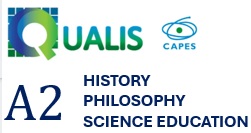“Strange Trajectories”
Naive Physics, Epistemology and History of Science
DOI:
https://doi.org/10.24117/2526-2270.2018.i5.06Keywords:
Naive Physics, Epistemology, History of Science, Psychology of Perception, ImpetusAbstract
In the 1980s naive physics almost suddenly became a field of research for physicists interested in teaching and experimental psychologists. Such research, however, was limited to accurately recording the bizarre Aristotelian responses of “layman” struggling with simple physics issues. Another research on this topic is that one of phenomenological origin: starting from the studies of the psychologist of perception Paolo Bozzi (since 1958) naive physics had entered the laboratory, and he was the first to find that the physical knowledge of the adult individuals were “Aristotelian”. Bozzi took advantage of these results in order to hypothesize a substantial diversity and independence of the sensory system with respect to the cognitive-rational one. Other interesting perspectives were considered by Piaget, who in the 1980s, confirming the spontaneous Aristotelism of children, provided a still prolific epistemological direction of such investigations: finding an explanatory mechanism that projects on the level of science construction that one of individual cognitive development.Downloads
Published
2018-12-09
Issue
Section
Dossiers (Issue-specific topics)
License
Copyright (c) 2018 Francesco Crapanzano

This work is licensed under a Creative Commons Attribution 4.0 International License.
How to Cite
“‘Strange Trajectories’: Naive Physics, Epistemology and History of Science”. 2018. Transversal: International Journal for the Historiography of Science, no. 5 (December). https://doi.org/10.24117/2526-2270.2018.i5.06.












